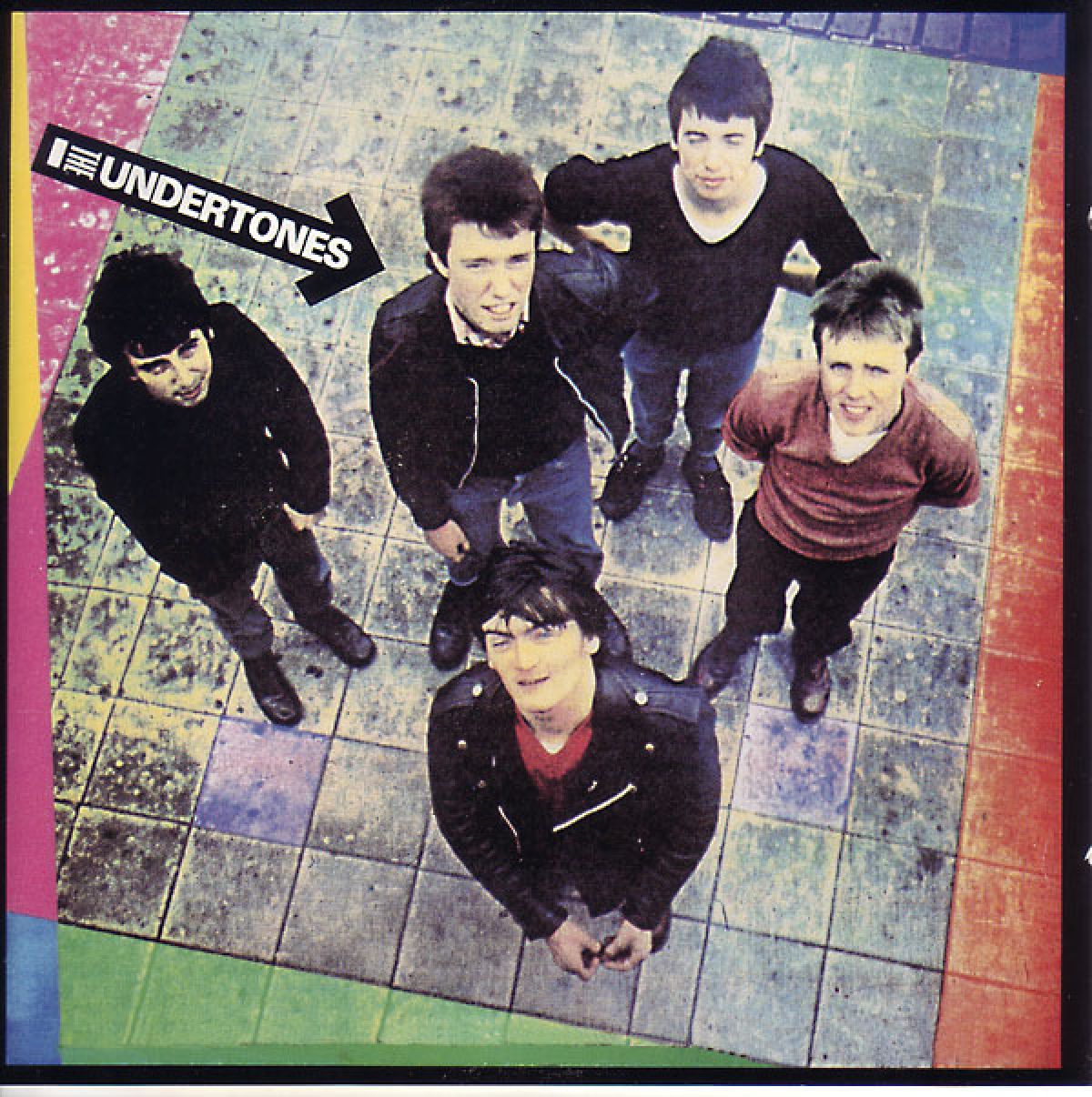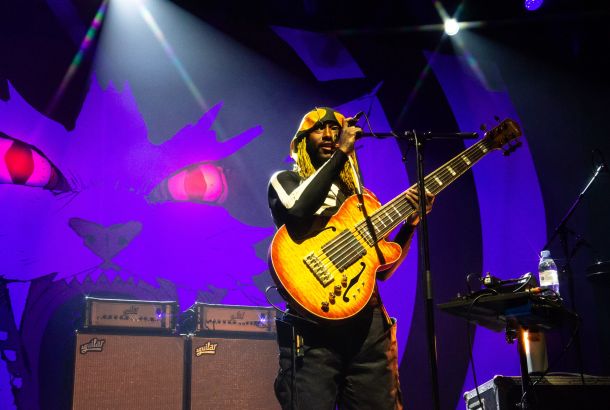In Conversation with The Undertones’ Mickey Bradley

Speaking to me from a “wee room” in Derry is Mickey Bradley – the veteran bassist and backing vocalist of punk legends The Undertones. The Irish rockers catapulted to fame in the 1980s after legendary radio presenter John Peel famously played their hit song ‘Teenage Kicks’ twice back-to-back.
Mickey appears to be in high spirits, a kind smile plastering his face as he attempts to steady his phone for the video call. Despite two years of staggered performances due to Covid-19, and now threats of a possible world war, it’s clear that the world hasn’t sapped him of enthusiasm.
After their initial split in the summer of 1983, the band reformed in 1999 with Paul McLoon replacing Feargal Sharkey as vocalist. Mickey confesses that he actually enjoyed performing a lot more the second time around.
“I think it’s because there’s no pressure,” he says. “We were very lucky we had some success y’know? But then there were a couple of years where we didn’t …about the third or fourth LP that was the first time we had someone from a record company putting their hands up and saying, ‘I don’t like this.’”
“We had a couple years of success and a couple years on the other side of the hill and then when we broke up, that was the right thing to do.”
Having done the hard work churning out songs in their youth and earning enough to no longer depend on it “to pay the rent,” Mickey feels like the group can relax and enjoy the ride of tours now. With 45 years of experience in the industry under his belt, it’s no surprise how nonchalantly he speaks of the band’s ease now.
“We don’t have to come up with new songs – that’s a very lazy thing to say I know – but we did make a couple of records like maybe 15 years ago and I really enjoyed doing that too. But now we’re in a very lucky place that we go along, and we play say, Manchester, and it’s not a huge show but it’s us and a great crowd.”
On the topic of records, I ask Mickey why ‘You’ve Got My Number (Why Don’t You Use It)’ from Hypnotised (1980) is his favourite track of The Undertones. He reveals that he loves the different riffs and lyrics to it.
“The words are great and the title gives me the opportunity to say in a very cheesy way – you’ve got my number – why don’t you use it!” he says, grinning.
Since The Undertones’ defining track ‘Teenage Kicks’ was released in 1978, punk music has gone through several transformations. The division between those that loved punk and rock has relatively subsided in comparison to the gulf that Mickey Bradley recalls.
“People who liked rock didn’t like punk. [They were] people who were four or five years older [that] looked down on us.”
He shares some particularly strong opinions about The Rolling Stones in the 70s. “[They] became absolute drivel! Hanging around with Princess Margaret? What the hell was that about?” he adds incredulously.
“Back then [punk] was a philosophy, if it is a philosophy [now], it’s not a philosophy I know. Back then it was that attitude that rock bands had got too far up their own arses, and that everything was gonna be big stadiums, and drinking champagne, and taking loads of drugs, and oh now I’m going to buy a big house in the country.”
“So, it was great that something else came along and said, ‘no that’s completely wrong.’ That it has become just this charade of people becoming really incredibly rich and just making fools of themselves.”
However, when it comes to punk’s ethos of self-governance and fearlessness, Mickey is adamant that it was something The Undertones aligned themselves with.
“That philosophy that anyone can do it, and everyone should do it, that was part of it and we definitely bought into that.
“We loved the Ramones, the older bands that punk looked back on, the New York Dolls and The Stooges – that still to me is punk music. Since then, it’s become a huge industry and you know my children loved bands like Green Day and so on, which would be defined as punk.
On the topic of the Ramones, I ask Mickey about his favourite Ramones album.
“Just in terms of the cultural history, the first Ramones album,” he says. “It must have been the summer of 1976, I remember I was in school with John O’Neill, it was him I borrowed it [from]. He said it’s great and all the songs were the same and they’re really really short and really really fast. So of course, I had to get up and go to his house to hear it. This was like a holy grail it was passed around us. And then I got a copy for Christmas in ’76.
“My brother said, ‘y’know I had to go around to three different record shops to get this’ – and there were only three record shops in Derry! So, I have that association with it.”
The Undertones were deep in the scene during punk’s (arguably) golden era in the ’70s/’80s. They had the incredible experience of supporting The Clash’s American tour – one of Mickey’s career highlights.
“We probably could’ve been friends, but we were very incredibly shy, and I was kind of embarrassed to be in the company of The Clash,” he humbly admits.
“We asked them to come to Derry to do a festival we were putting on. Great idea, free festival because no one ever played in Derry. So, we asked The Clash and The Clash said yeah!”
Fast forward to 1979, in a surprise turn of events, the festival in Derry unfortunately was cancelled due the rising political tensions during the Troubles.
“Joe Strummer got a threat from a loyalist parliamentary group in Derry,” says Mickey. “At the time, he came along to the studio with his manager, and he was very apologetic. He said ‘I’m being threatened here’ because a few months earlier he’d made some comment about the British army in Northern Ireland. So, there was this death threat to him and we, especially me, were like ‘that’s not credible at all!’ because we’re from Derry, and I kind of go, well, even if it was genuine, we’re going to be in a part of Derry that those guys wouldn’t come in. I had all these stupid things to say in my mind – thankfully I never said it.”
He explains the police did verify the legitimacy of the threat. At the time they didn’t reveal the real reason the festival was cancelled – instead opting to make up a story about not getting insurance for the event.
On touring in America with The Clash, Mickey reveals that The Undertones got a taste of London Calling before its official release.
“I can remember sitting in these very big venues in America and watching them doing a soundcheck and they were doing this song – ‘Clampdown’.
“I’m sat there going, I’ve never heard this before – ‘Clampdown’? That’s great! It was almost like seeing The Clash for the first time.”
“They were really, really kind to us. Made sure we got soundchecks. And we did kind of hang out with them a wee bit. But they were in a different level from us, just in terms of the things they knew about and how cool they were compared to us.”
He recalls one particular memory of The Undertones taking photos with The Clash to advertise an upcoming gig.
“We went outside and got a couple of photos taken of us all together to publicise it. And I always thought we were like refugees from some kind of cruel third world country somewhere meeting these rock and roll gods, y’know? And they were bestowing their gifts on us,” he says chuckling.
“They weren’t doing that, but they looked so good, and we looked like we’d just got out of bed. They were absolutely brilliant people, really were.”
I ask him if he keeps in touch with the living members – Mick, Topper and Paul. He shakes his head.
Smiling he says, “I know my place.”
After a couple years of struggling to churn out commercially successful records, vocalist Feargal Sharkey left the band, but the reasons publicised were rather vague. I ask Mickey to shine some more light on that career-altering period.
“When you don’t have success like that it can lead to some strains which were there before but under the surface. Feargal had a different outlook to the rest of us in terms of success,” he says.
“I remember we had a band meeting – bands have meetings and they’re always terrible. I remember it was something about one of our latest singles that hadn’t done well. If we made a record and it gets a great review in the NME but doesn’t sell a lot, I’d be happy with it, that would kind of do me.”
Feargal, on the other hand, didn’t feel the same:
“It was like an AA meeting. He says, ‘I want out, I want out the band’ and I think Damien or john says ‘so do I’. We all went yeah, let’s put it out of its misery.”
“One of the tensions was that Feargal didn’t write many of the songs so that led to him taking almost instructions from the songwriters when he was singing it in the studio, which was the wrong thing to do. We should’ve just left him to sing it, he was a good singer.
“The most relevant reason to why Feargal wanted to leave is that he realised he could do better. He was a really good singer and singers are always the most recognised in the band so he had the profile. [He was a] great singer, much loved and respected by people in music.”
It’s fair to say that Feargal Sharkey made the right decision for his own career. His solo single ‘A Good Heart’ (1985) was an international success and went to number 1 in the UK charts.
Mickey seems at peace with going separate ways with Feargal though. He explains The Undertones didn’t even ask Feargal to re-join as part of the reunification of the band in the 90s.
“We didn’t ask him, and he didn’t ask why he wasn’t asked. Because he knew he wouldn’t want to do it, and I think if he had said yes, it wouldn’t have worked because the dynamic would’ve been wrong. If Feargal would’ve come along someone else would’ve dropped out.”
Moving on to the present, I ask Mickey about life in Derry and his opinion on the hit tv series Derry Girls (2018—), which depicts the lives of young girls living in Derry during the last years of Troubles in Northern Ireland.
“I think anyone in Derry remembers when [Derry Girls] first came along. You were watching the first episode because it was a big deal you know. A Channel Four comedy set in Derry and you were sat there going, ‘I hope this is good.’ They’ve had comedies made about Northern Ireland and they weren’t good.
“Within the first minute you watch it and you’re like this is good. There’s a scene where they’re in the school bus and they go down and tell the wee girl ‘get off that’s our seat,’ and she says, ‘why what you gonna do?’”
I laugh when Mickey mimics the girl’s sass in his imitation.
“It’s such a huge thing in Derry. There’s a huge mural of the Derry Girls. Channel Four commissioned it for the second series which is a great idea. They got local mural makers to do this and it’s an instant tourist attraction – I’ve had my photo taken beside it.”
“The Undertones were the original Derry Boys” he says proudly.
“They get it all right. The one I always remember is…the scene where they’re gonna get fish and chips. Someone has been sent out with the order and the order has always changed; the order is always like burger but no cheese but more onion and all this and that is SO Derry. Like I’ve been in chip shops and people go in with orders and it’s a really complicated orders, and the woman behind the counters says yep, yep, yep and she gets it right every time. It’s just wee things like that, makes you go ‘nailed it’.”
On the topic of modern pop culture, I ask him about One Direction’s Comic Relief charity single ‘One Way or Another (Teenage Kicks)’ (2013), which famously mashed Blondie’s and The Undertones’ hit singles.
“At the time I thought- this is brilliant, this is absolutely brilliant! People would say ‘are you not insulted by it? What do you think?’ thinking I would slag it, but I was like, it’s One Direction!
“When it happened, I was in my 50s – I’m not the person to judge, I just know that they’re doing one of our songs and thought it was absolutely brilliant. They didn’t do a Stiff Little Fingers song, did they? No, they didn’t!”
One Direction are far from the only boyband to cover ‘Teenage Kicks’ though. Mickey recalls a time where he took his three eldest children to see Green Day in Northern Ireland and “I stood there and to be honest my legs were sore. They did ‘Teenage Kicks’ during the encore,” he says rather smugly. “It exists itself. ‘Teenage Kicks’ is much more popular than The Undertones.”
Mickey states performing the hit single on Top of the Pops was one of the highlights of his career: “If it had have stopped there, I would’ve been happy.”
“My mother went and bought new pyjamas for me,” he says, recalling the time when he found out he was heading to England to record their set for the show. “It’s like making sure if you ever get knocked down by a car, you’re wearing clean underwear. She didn’t want me to go to London and show myself up.”
Moving on, I ask Mickey about books, and he surprisingly states the book he keeps going back to is the classic tale A Christmas Carol.
“I started reading it around 15 years ago and [then] started reading it every December. It’s not that easy a read but its still a book that I would always come back to. It’s the wee things that resonate now. You have to try and do good when you’re around.”
He also gives an honourable mention to The Fall’s Paul Handley, who wrote the book ‘Leave the Capital’ about the music scene in Manchester.
On the topic of The Undertones upcoming new compilation album, I ask him what’s so different about the remastered tracks. He answers with an admirable, though potentially commercially unwise answer of “it still sounds the same to me.” But then he goes onto clarify that the compilation takes “the better songs of the two LPs and distilled them together.”
The Undertones new compilation album Dig What You Need will be released on 11th March 2022.
The Undertones will embark on a UK tour from March to October 2022, including a date at Manchester’s Academy 2 on the 25th March. You can buy remaining tickets here.
The Undertones will be shortly on tour around the UK. The dates and tickets can be found here.
Interview conducted by Jay Mitra.







